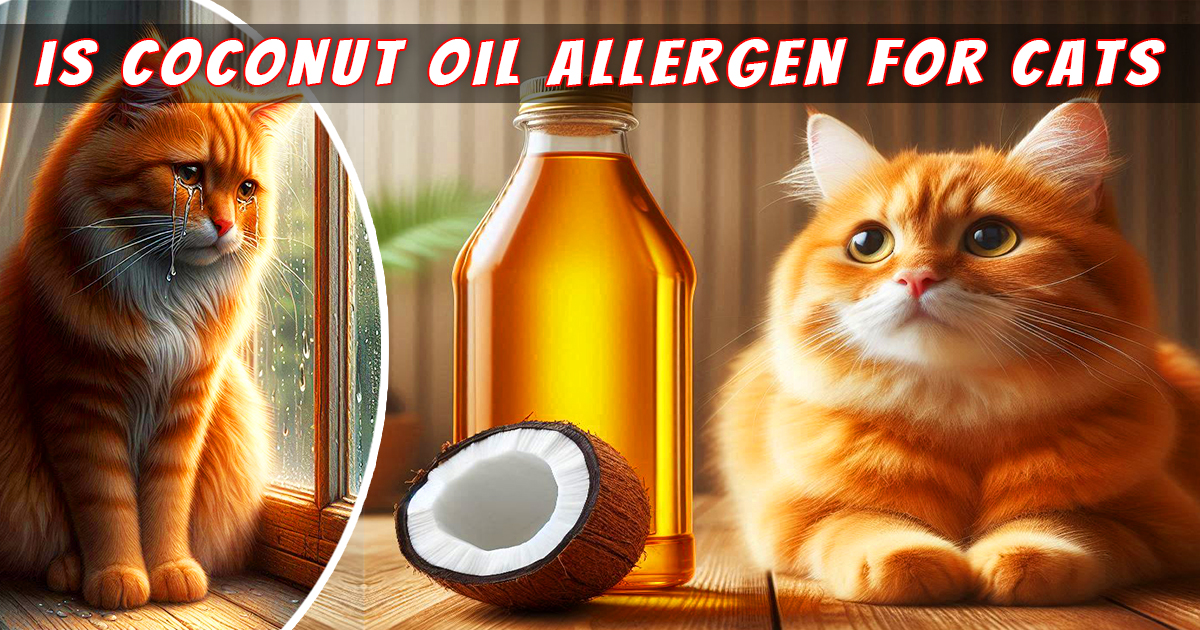Coconut oil is often praised for its numerous health benefits, but when it comes to our feline friends, some pet owners wonder: Is coconut oil allergen for cats? While coconut oil is generally considered safe for cats, it’s important to know how your cat may react to it. In this article, we’ll explore the surprising facts about coconut oil allergies in cats, its benefits, and how to safely use it to avoid any unwanted side effects.
1. Is Coconut Oil Allergen for Cats?
The main question on many cat owners’ minds is, “Is coconut oil allergen for cats?” While coconut oil is not commonly known to be a major allergen, it is still possible for a cat to develop an allergic reaction. Allergies in cats can manifest in various ways, and the immune system may react negatively to certain substances, including oils.
Coconut oil and cat allergies are not well-documented, but that doesn’t mean the risk is non-existent. Every cat’s body is different, and some may be more sensitive than others. It’s crucial to watch for any signs of an allergic reaction when introducing coconut oil to your cat’s diet or skincare routine.
Common Symptoms of Allergic Reactions in Cats:
- Itching and scratching
- Swelling or redness of the skin
- Digestive issues like vomiting or diarrhea
- Respiratory problems, such as sneezing or coughing
If you notice any of these symptoms after giving your cat coconut oil, stop using it immediately and consult your veterinarian.
2. Benefits of Coconut Oil for Cats: Skin, Fur, and More
Despite the potential for allergies, coconut oil benefits for cats are well-recognized. This natural oil can provide several advantages when used properly. Here are a few ways coconut oil can improve your cat’s health:
A. Improves Skin Health
Coconut oil is excellent for cats with dry or flaky skin. The fatty acids in coconut oil provide hydration, which can soothe irritated skin and reduce inflammation.
B. Enhances Fur Quality
Many cat owners notice a shinier and softer coat when using coconut oil on their pets. Applying a small amount to your cat’s fur can help with issues like dryness or matting.
C. Supports Digestive Health
When ingested, coconut oil may help promote a healthier digestive system by assisting with nutrient absorption and preventing constipation.
D. Boosts Immune System
Coconut oil contains lauric acid, which has antimicrobial and anti-inflammatory properties. This can help boost your cat’s immune system and combat infections.
While these benefits are promising, you should be cautious when incorporating coconut oil into your cat’s routine to avoid potential allergic reactions.
3. Can Cats Have Allergic Reactions to Coconut Oil?
While rare, coconut oil side effects for cats are possible. An allergic reaction can range from mild irritation to severe symptoms that require medical attention. Knowing the signs of allergic reactions in cats can help you catch issues early and prevent further complications.
For more detailed guidance, visit Petmd to ensure your cat’s health and safety.
How Can You Tell If Your Cat Is Allergic to Coconut Oil?
Cats can exhibit various signs of sensitivity or allergies to coconut oil. The most common reactions include:
- Skin Irritation: Coconut oil can cause itching, redness, or swelling on the skin.
- Digestive Problems: If ingested, it may lead to diarrhea, vomiting, or upset stomach.
- Respiratory Issues: Some cats may experience coughing or sneezing due to an allergic response.
If your cat shows any of these symptoms, discontinue the use of coconut oil and consult a vet. It’s also important to introduce new substances gradually, observing how your cat reacts over time.
4. How to Safely Use Coconut Oil on Cats
To avoid adverse reactions, it’s essential to use coconut oil safely on your cat. Here are a few guidelines to follow:
A. Start with Small Amounts
When trying out coconut oil for the first time, start with a tiny amount and see how your cat responds. This is especially important if you’re applying it to their skin or giving it orally.
B. Topical Application
For cat skin allergies, you can apply a small amount of coconut oil to the affected areas. Massage it into the skin gently, making sure your cat doesn’t ingest it immediately.
C. Ingestion
If you’re using coconut oil for its digestive benefits, mix a small amount with your cat’s food. Start with ¼ teaspoon per day and gradually increase the dosage if there are no negative reactions.
D. Monitor Closely
Always keep a close eye on your cat after introducing coconut oil to their diet or skin routine. If you notice any signs of discomfort, stop using it and consult your vet.
5. Alternatives to Coconut Oil for Cats with Sensitive Skin
If your cat experiences an allergic reaction to coconut oil, there are other safe oils that can offer similar benefits without causing irritation. Here are some alternative oils for cats:
A. Olive Oil
Olive oil is a great alternative for moisturizing your cat’s skin and improving coat quality. It’s less likely to cause an allergic reaction and can be used both topically and in their food.
B. Fish Oil
Rich in omega-3 fatty acids, fish oil can improve your cat’s skin, fur, and overall health. It’s particularly useful for cats with allergies or inflammatory skin conditions.
C. Flaxseed Oil
For a plant-based alternative, flaxseed oil offers plenty of omega-3s to support your cat’s immune system and skin health.
Each of these oils has its own benefits, and like coconut oil, they should be introduced gradually to ensure your cat does not react negatively.
6. Signs of Coconut Oil Sensitivity in Cats: What to Look For
While coconut oil is generally well-tolerated by most cats, it’s important to be aware of the signs that your cat might have a sensitivity to it. Some cats may not react well to coconut oil, especially if they have sensitive skin or underlying allergies. Knowing what to look for can help you act quickly and ensure your cat’s well-being.
Skin Irritation
One of the most immediate signs of sensitivity is skin irritation. After applying coconut oil topically, watch for redness, swelling, or excessive scratching. Cats with sensitive skin may develop small bumps or rashes at the site of application, which is an indication that the oil is not suitable for them.
Digestive Issues
If you’re giving coconut oil orally, monitor your cat’s digestive health closely. Signs that coconut oil may be upsetting their stomach include vomiting, diarrhea, or changes in appetite. If these symptoms appear, it’s best to stop giving the oil and consult a vet for advice.
Behavioral Changes
In some cases, cats may exhibit changes in behavior if they are reacting negatively to coconut oil. They might become more lethargic, restless, or irritable. Any noticeable shift in their usual demeanor could indicate that coconut oil is not agreeing with them, especially if it coincides with topical or dietary use of the oil.
7. Is Coconut Oil Suitable for All Cats? Understanding Individual Needs
Not all cats will react the same way to coconut oil. Just as with humans, cats have individual sensitivities, and what works well for one might not be suitable for another. This is why it’s essential to consider your cat’s specific needs before deciding to use coconut oil.
Cats with Pre-existing Skin Conditions
Cats with pre-existing skin conditions, such as dermatitis or eczema, may react differently to coconut oil. While some cats might find relief from the moisturizing effects of the oil, others could experience flare-ups or worsening symptoms. Always test a small amount on a small area first to ensure that it does not aggravate any existing skin issues.
Obese or Overweight Cats
Coconut oil is high in fat, and while it can have some digestive benefits, it should be used sparingly in cats that are obese or overweight. The added calories could contribute to weight gain if not monitored closely. If your cat is on a specific diet for weight management, consult your vet before introducing coconut oil to their routine.
Conclusion: Is Coconut Oil Safe for Cats with Allergies?
In conclusion, while coconut oil for cats’ fur and skin can offer significant health benefits, it’s important to be cautious. Coconut oil may not be an allergen for most cats, but there’s always a risk, particularly for those with sensitive skin or pre-existing allergies. Monitoring your cat’s reaction and using coconut oil in moderation is key to avoiding unwanted side effects.
If your cat shows any signs of discomfort, consult a veterinarian immediately and consider switching to an alternative oil like olive or fish oil.
Frequently Asked Questions About Coconut Oil and Cats
1. Is coconut oil toxic to cats?
No, coconut oil is not toxic to cats. However, some cats may have allergic reactions or digestive issues if given in large amounts.
2. Can coconut oil help with cat hairballs?
Yes, coconut oil can help reduce hairballs by improving your cat’s digestion and lubricating their digestive tract, allowing hair to pass more easily.
3. How often can I apply coconut oil to my cat’s skin?
You can apply coconut oil to your cat’s skin once or twice a week, depending on their needs. Always start with a small amount and observe for any adverse reactions.
4. Can coconut oil help with cat dandruff?
Yes, coconut oil can help moisturize dry skin, reducing dandruff and improving the overall condition of your cat’s fur.
5. What should I do if my cat has an allergic reaction to coconut oil?
If your cat shows signs of an allergic reaction—such as itching, swelling, or vomiting—stop using coconut oil and consult your vet immediately
For more informative and interesting articles, visit our homepage at My Read Magazine

Joseph Bush is a seasoned writer and researcher with over 7 years of experience covering a wide range of general topics, from lifestyle and technology to business and current events. He is dedicated to producing fact-checked, reader-friendly content that informs, engages, and empowers readers.
Throughout his career, Joseph has followed strict editorial guidelines, relied on reputable sources, and ensured every article meets the highest standards of accuracy and clarity. His expertise spans multiple fields, allowing him to explain complex topics in a way that’s easy to understand.
Passionate about continuous learning, Joseph stays updated on industry trends and best practices to deliver trustworthy, well-rounded insights. Readers can rely on his work for its credibility, depth, and real-world relevance.




